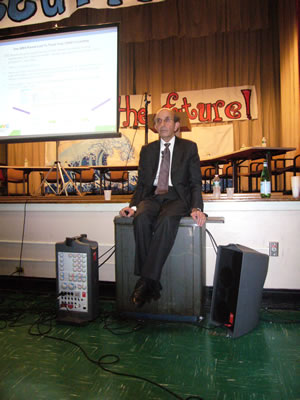By Albert Amateau
Overcrowding and charter schools were among the top issues last week when Schools Chancellor Joel Klein spoke to parents at a forum in Chelsea.
Klein also talked about declining funding, standardized testing and the problem about reducing class size in city schools.
“Overcrowding is a real issue and we’re cognizant of it,” said Klein. “There are thousands of parents on waiting lists and finding space is a challenge. The challenge will become more intense next year when $850 million in federal stimulus money expires,” he added. “We have lots of needs and we have to be able to do more with less.”
After six years of smaller numbers of students per class, class size has gone up because of state budget cuts, Klein said.
Nevertheless, he said that more than 5,000 new seats have been added to schools in Community School District 2 and 1,500 more are being planned. Klein also claimed that during the past six years since mayoral control of education, high school graduation rates increased from 39 to 55 percent. Reading and math scores have also risen, except for last year, when higher standards were adopted.
While he acknowledged that standardized test scores are not the only criteria for judging the education system’s success, he insisted they are needed to establish a system of accountability.
“Standards will have to rise,” he said.
Shino Tanikawa, a member of the District 2 Community Education Council, but speaking only as a district parent, said she did not like the emphasis on standardized tests. She said she accepted the need to assess achievement but that parents need a holistic evaluation of student progress.
Klein also reaffirmed his commitment to charter schools, saying, “I believe space belongs to the children, not to one program or another. Parents want choice and we have 40,000 families on waiting lists for charter schools. I’m not for one type of school or another,” he stated.
But Tina Schiller, a parent at P.S. 234, in Tribeca at Greenwich and Chambers Sts., said there was no justification for devoting space to “3 percent of the city’s students [in charter schools] when the 97 percent of students in the public system need it,” she said, adding, “Space is being given to for-profit charter schools.”
“We don’t have for-profit charters,” Klein replied, adding, “They’re all public. And we have 40,000 parents who want the choice.”
However, Leonie Haimson, a Greenwich Village parent and president of the advocacy group Class Size Matters, wrote to this newspaper in an e-mail later that there are nine charter schools, in the Bronx and Queens, that pay management fees to for-profit educational management organizations. About 26 other charters pay management fees to nonprofit charter management organizations, Haimson said.
In another e-mail after the forum, Ann Kjellberg, a Village school advocate, disputed the chancellor’s statement that 5,000 seats have been added in the district. She added that every new program added to a school building eliminates classroom seats to make room for administrative space and new programs that draw students from outside a district, as charters do, displacing district students.
However, the biggest delegation to the Oct. 27 District 2 C.E.C. meeting at P.S. 33, at 27th St. and Ninth Ave., were parents of Millennium High School, at 25 Broad St., who cheered their spokesperson, Tom Moore, when he reminded the chancellor that the Lower Manhattan school has been demanding a gym for its five years of existence.
“We still have more than $2 million in state-and-city-committed funds for a gym and we believe there is space available,” Moore said.
The school, whose enrollment has increased to more than 620 this year from 576 last year, is severely overcrowded, Moore said.
“I get it, I get it,” said Klein, replying to Moore and the group of sign-waving Millennium parents at the forum. A Millennium gym is a question of finding appropriate space, Klein said.
Alan Zausner, father of a 12-year-old special education student who goes to Lab School, the middle school on W. 17th St., acknowledged that his son has made great progress. But he said that families with special-needs children have to struggle to get their children mandated services.
“Every year the system changes and parents who don’t have a voice get left out,” Zausner said.
Klein replied that the change this year was to get local schools to serve special-needs students who live in the school area.
“Our needs are great and our resources strained,” he said.
A parent leader of P.S. 11 in Chelsea, told Klein that parents want to keep all educational programs, including gifted-and-talented and special education, under one roof at 320 W. 21st St.
The mother of two boys at P.S. 33 said attention must be paid to gay-lesbian and racial harassment in the school.
“Is there a proactive approach to telling kids what not to do?” she asked.
Klein said the Department of Education takes the problem seriously. The school system has a Respect for All program to address racial and sexual orientation intolerance, said Klein, who praised City Council Speaker Christine Quinn for leading on the issue.





































